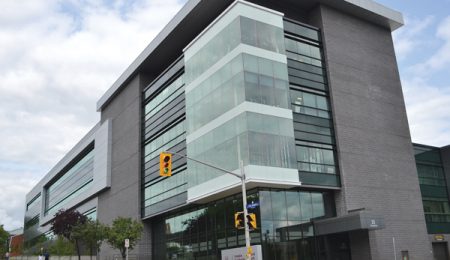Commercializing research, liberal arts and ‘entitled’ millennials
Calin Rovinescu, CEO of Air Canada and new chancellor of the University of Ottawa, initiated the first ever Chancellor’s Debate, a series to be held twice a year that addresses contemporary issues affecting students.
The inaugural debate took place on March 31 at Tabaret Hall, and asked the question, “How are universities preparing graduates for the ever-changing global job market?”
The four panelists included Rovinescu, U of O president Allan Rock, Alex Johnston, vice-president of strategy and public affairs at CBC, and Marie-Hélène Lafond, political and economic affairs specialist for the U.S. Consulate General.
Opening positions kicked off after introductions from debate moderator Nathalie Des Rosiers, dean of the Faculty of Common Law.
The early consensus was that the role of preparing students wasn’t solely that of the university, with panelists pinpointing the four pivotal stakeholders: students, universities, the government and employers.
Rovinescu and Johnston both focused on the importance of disruption in the face of the changing working world, and Rovinescu identified the catalyst for the debate question itself—employers believe graduates are not ready for entry level positions, while educational institutions do.
Lafond succeeded him at the podium, praising her experiential learning when she was a co-op student and stressed an important message that was reiterated by the other panelists. “Do not underestimate liberal arts—we can accomplish a lot,” she said.
Rock agreed saying these undervalued programs are the very ones that prepare students for what employers are looking for—critical thinking.
He was firm on his position that universities do prepare graduates for the job market, but also that employers share the responsibility of investing in graduates like universities have.
“Universities exist first and foremost to contribute to the personal development of our students,” said Rock, and that they weren’t “to serve as trade schools,” the latter remark being brought up throughout the debate.
Moving to question period, Des Rosiers said there was a disconnect between universities and employers about graduates’ work readiness, and asked if the problem was a misalignment of information or if each party was placing blame on the other.
Rock said there was a bit of both, but Johnston went further to say the stakeholders didn’t have a common vision and the private sector had to be the first to approach the universities and government to partner with them.
In response to Des Rosiers second question about a lack of innovation in Canada and who was responsible for it, Rock was quick to jump at the private sector, saying they don’t invest in research and development.
Lafond said although Canada has a history of innovation, it had failed to commercialize its research, which Johnston echoed and said, “To not embrace the private sector which is building our economy in a truly meaningful way is a missed opportunity.”
Rovinescu said they needed to look at the successful models of relationships between universities and the private sector, like Google and Stanford University, where Google supports a number of technological and engineering projects.
After question period was opened to audience members, Anita Shrier, who works at the university’s co-op office, asked how to address the overly high expectation she sees from students, prompting a topical discussion about millennials.
While responding to Shrier’s question, Rovinescu said she was being “politically correct” and was too polite to use the term “sense of entitlement”, a comment that elicited audible grumbling and laughter from the audience.
As the debate came to a close, the external panelists jumped to the defence of millennials, with Lafond saying they were ready to take the world, and Johnston making an informative point on the criticism of their “job hopping.”
“The label is entitlement, the reality seems to be contract work.”





